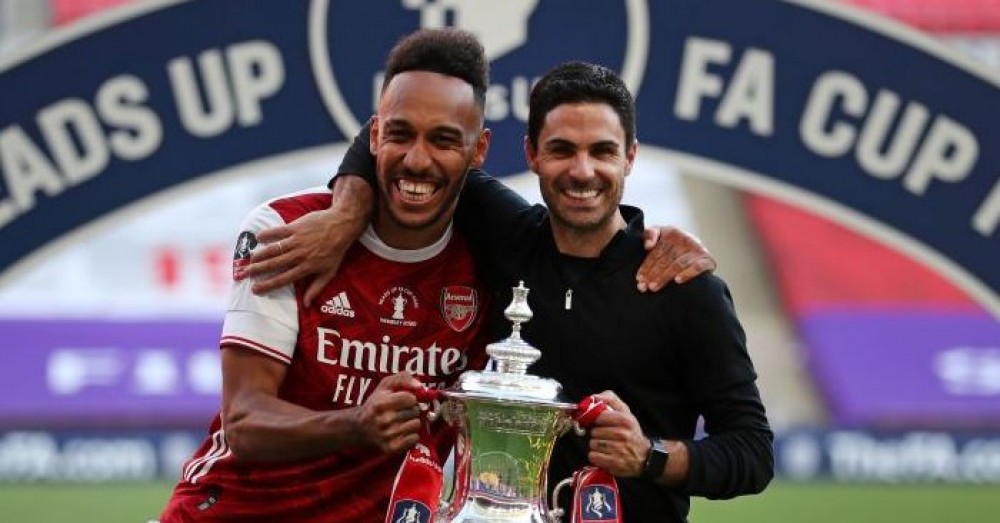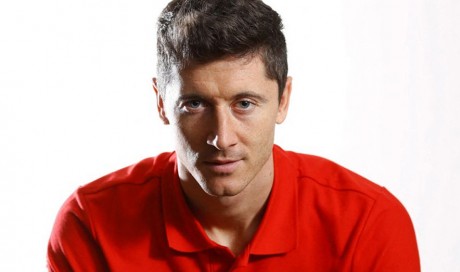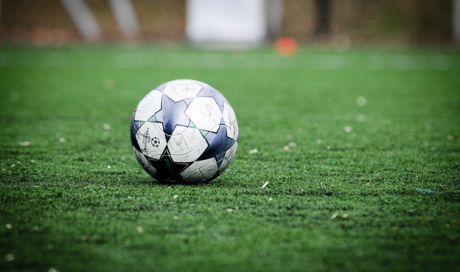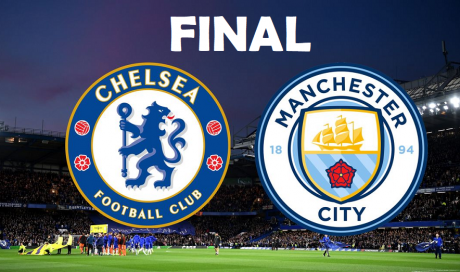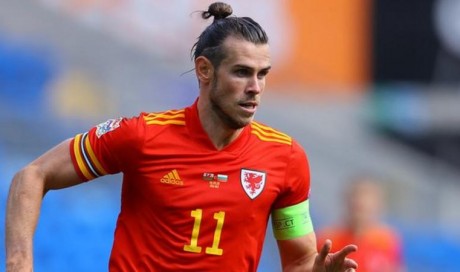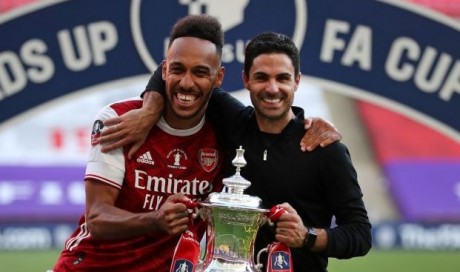1) Ten days. A week and a half. That is how long has passed since Mikel Arteta’s record at Arsenal was mockingly compared to that of his predecessor. We were told that his ‘job at the Emirates doesn’t appear to be in any danger despite the inconsistent results’. There were requests for tangible proof of his much-heralded impact in north London by scoffing doubters. Some fans even continued to question the club’s ambition and direction long into the summer.
Seven months. Thirty-two weeks. That is how long it has taken for Arteta to deliver on the promise, to show what his Arsenal can be, to achieve more than many have with years of faith and millions of pounds of support behind them. Jurgen Klopp and Chris Wilder can argue over the Manager of the Year award but Arteta will watch from the deserved final place on that podium. He picked up an awful lot during his time just putting cones out for Pep Guardiola.
2) Honestly, though, what a remarkable achievement. Arteta spoke recently of being able to “write a book” about his first six months as a manager, and he has penned the perfect conclusion to an opening chapter comprised of a fractured and imbalanced squad, a disenfranchised support, an aimless club, a global pandemic and a pay cut. It takes a skilled tactician, gifted orator and empathetic individual to address each of those points so quickly and unanimously. For someone with no proof of previous success to point toward, it’s almost unheard of.
Most impressive is that he engineered victories in the semi-final and final – Arsenal’s two biggest games of the season – instead of simply being the lead passenger on a runaway train, as with Roberto di Matteo at Chelsea in 2012. If his first objective was to change the culture of the club, beating the two most recent champions of a competition to win it yourself ought to do it.
3) This could be the most important result in Arsenal’s recent history. It sounds like hyperbole and might well prove to be, but the consequences are far-reaching and numerous. European qualification bleeds into an increased budget and wider array of potential transfer targets. Winning trophies breeds a certain mentality that is impossible to otherwise replicate. Reaching such destinations makes the inevitable bumps in the journey more palatable and forgivable.
It can become a self-fulfilling prophecy, the opposite to which Arsenal have been interminably realising for more than a decade. They have won this trophy before – more than any other team, in fact – but this does feel different.
4) Chelsea can feel aggrieved: by injuries, by the officials and by familiar foibles being exposed on the biggest stage. The early removal of Christian Pulisic in particular changed the course of the game but sympathy levels are low for a team exhibiting the same defensive issues in August 2020 as they did in August 2019.
They will start next season with a ludicrously talented attack but Kevin Keegan would wince at how that contrasts with the other end of the pitch. Chelsea need an upgrade in every defensive area. And that includes a dedicated coach.
5) It is worth wondering what might have been had Pulisic not limped off soon after half-time. He was thrillingly direct and positive, completing more dribbles than any player (4), taking his goal superbly and somehow almost adding a second on barely half a leg.
Chelsea did not have a single shot on target after he was taken off. Try as he might, Pedro simply does not offer that same snap and burst. It would be an incredible shame if Pulisic was to be sidelined for long.
6) It is a coincidental inevitability that he and Cesar Azpilicueta, who have played 769 and 979 minutes of high-level, high-stakes sport respectively in the past 41 days with little rest of any kind, both succumbed to the same injury after intense sprints. Ligaments and tendons can go at any moment and under all sorts of pressure but playing every three days or so over six weeks made it so much more likely.
There was no alternative, of course, if football was to return. And while some find it weirdly difficult to elicit much sympathy for well remunerated athletes in any event, it is worth remembering they have risked their bodies in more ways than one to make this possible. This kind of setback can irreversibly change players physically and mentally; next season will be similarly perilous.
7) With regards to Lampard’s other legitimate excuse, this was not Anthony Taylor’s finest evening. Mateo Kovacic’s second yellow card was as laughable as Mason Mount’s first, Granit Xhaka’s exaggeration not helping the situation. It seems unlikely Arsenal did not commit their first foul until the 55th minute. And the apparent lack of a proper check on Emiliano Martinez potentially handling outside his area was strange. That is on VAR and not Taylor, but still.
But Lampard would be wrong to suggest only Chelsea suffered for the mistakes of the officials. Azpilicueta should have been sent off for the foul that conceded the penalty. It was almost identical to David Luiz’s red card against Manchester City in June, down to the covering defender and the identity of the referee himself. Rules regarding the denial of a goalscoring opportunity have been revised to no longer make sendings off automatic but ‘deliberate fouls will still incur a red card’. Azpilicueta’s clearly fell into that category and while Taylor deserves credit for playing the advantage, his treatment of this foul and Luiz’s against City highlighted the problem many fans have: if individual referees can’t apply the laws consistently against their own previous decisions, something is deeply broken.
8) Arsenal established a common first-half theme as early as the third minute. Ainsley Maitland-Niles was released down the left-hand side, emerging victorious from a one-on-one battle with Reece James to cross for Aubameyang, who should have done better with his header. The Gunners would keep targeting that flank with long balls over the top from defence, until it finally paid the ultimate dividends when Aubameyang was played in behind Azpilicueta for the penalty.
It was a sensational pass from Kieran Tierney, whose technical proficiency can often be obscured by his energy and tenacity. His ability to saddle a central and wide role simultaneously has been absolutely crucial under Arteta. What a performance to cap a difficult first season.
9) His combination with Maitland-Niles was wonderful at times. The point has been made previously but his progression under Arteta might be the most intriguing of any player at Arsenal yet.
“Ainsley needs to put his head down and work hard,” said the manager after the win over Portsmouth in March. “Show me every day in training that he wants it more than anyone else, he wants to play for this club and fight for his place.”
By June, that battle looked to have been lost. The Athletic reported that ‘Maitland-Niles senses a lack of trust in him from Arteta’ and he wanted to leave.
Later that month, Arteta praised a player who had “changed a lot of things, a lot of positive things”. Soon after, Maitland-Niles said: “It’s about building the trust so every day I’m training better, making less mistakes and showing that I’m really hungry and want it and he’ll finally put the trust in me and I’m going to play on the pitch.”
He played two minutes of the club’s final seven games before Project Restart, and 442 minutes of their 13 matches since. To start someone with such an uncertain immediate future in a cup final is a remarkable show of trust from the manager but a necessary example that reputations are not set in stone and there is always a way back for those that want to earn it. Maitland-Niles has clawed himself back from the same path Mesut Ozil and Matteo Guendouzi have lost themselves down. Whatever happens this summer, he can be proud of that.
10) Danny Murphy is riotously baffling.
If someone could find each of those moments, clip them together and tweet them from a football banter account, that would be great.
11) Kovacic is such good fun to watch sometimes. There was a moment late in the first half, as Arsenal pressure was building and their second goal seemed imminent, that the ball rebounded to the midfielder, facing his own goal, surrounded by opposition players. In one swift movement he turned, then glided clear of Nicolas Pepe and Hector Bellerin to turn panicked defence into controlled attack in an instant.
His is not the kind of game that lends itself to statistics; he is neither an excellent tackler nor an incisive forward. But he might be the most press-resistant midfielder in the Premier League outside of Anfield. It is a valuable skill that deserves a better screening player behind.
12) But the best midfielder of the game was Dani Ceballos. As great as Xhaka also was, the Spaniard was a class above in terms of stitching everything together.
As Arsenal would not have won without him, it is worth considering setting aside the prize money and financial reward for European qualification to sign him permanently. Fans will forever be inclined to prefer new names and faces – football has a collective love for the unknown – but he fits the squad and has already emerged from the sort of settling-in period that a summer signing would need. If they can, Arsenal absolutely have to get him. There is no point chasing inferior and less suitable players than one they have built a lasting connection with.
13) Perhaps it is an inevitable byproduct of putting two relatively inexperienced managers in charge of somewhat naive squads, but the effect of the first-half drinks break was apparent. Chelsea had looked comfortable enough before the drinks break and Arsenal were forced into a couple of press-induced mistakes. Arteta was notably animated during the pause and his team’s immeasurable improvement after the restart mirrored Chelsea’s decline. The Blues completed two passes to Arsenal’s 17 from the 22nd minute to the 28th, such was the damage caused to their momentum.
Arsenal ended the half well but concerns that it required Arteta’s forcible intervention are legitimate. Chelsea started the half well but unease at the fact they were knocked so easily off track and Lampard struggled to correct that are fair.
14) Giroud’s assist was the Frenchman at his purest and most distilled form: a delightful backheel into the path of Pulisic while occupying a couple of defenders in the six-yard box. But that was the sum total of his offering. Aside from the kick-off after Aubameyang’s second, Giroud had four touches in his final 20 minutes – as many in his own half as the opposition one. He had a touch each in the Arsenal and Chelsea penalty areas.
They certainly didn’t play to his strength but, in truth, he only really has one. His hold-up play is sumptuous but David Luiz did not find it difficult to neutralise him after that collective early failure. Timo Werner will be such an improvement on Chelsea’s current centre-forward options that it is almost laughable. Imagine having a focal attacking point who is adaptable to different situations.
15) The difference between Giroud and Aubameyang was almost painful. The Arsenal striker forced the penalty by resisting the challenge long enough to make it into the area, scored the subsequent spot kick and thoroughly embarrassed Kurt Zouma for the winner.
He is underrated. Comprehensively so. To reiterate:
‘No other striker has first arrived on these shores in their prime, at a substantial price and with an established reputation, and succeeded. Andriy Shevchenko was a 29-year-old failure, Hernan Crespo, Roberto Soldado and Islam Slimani all 28-year-old disappointments. None came close to taking the culture shift in their stride quite like Aubameyang, who has maintained his own levels of excellence even during Arsenal’s period of ineptitude.’
Pretty much. Twenty-nine goals in this team. Two in each of the semi-final and final. And only a third trophy of his career. Ludicrous.
16) Someone should probably sue Antonio Rudiger for falsely advertising himself as a defender. He was the furthest player back when Hector Bellerin collected the loose ball about halfway inside Arsenal’s half. The right-back burst forward but as the rest of the Chelsea back line instinctively dropped to maintain a numbers advantage, Rudiger inexplicably stood still in the path of a sprinting Bellerin and was duly nutmegged. Pedro and Kovacic had surrounded the Spaniard and ensured a four-man attack could be countered by a seven-man defence, yet Rudiger threw everything into disarray by diving in and taking Pedro, Kovacic and himself out of the game.
Arsenal’s winner was somewhat fortuitous from there, Andreas Christensen’s tackle bouncing out to Pepe, who calmly played Aubameyang in to score. But it was as much a failure of structure as it was the individuals within it. Chelsea went from drawing to losing because they were so determined to win that they fielded no midfielder with a semblance of defensive or positional awareness. Arsenal tore straight through a Chelsea centre that was susceptible by design. Lampard would be foolish to think these are problems that can be solved with a signing or two.
Share This Post

